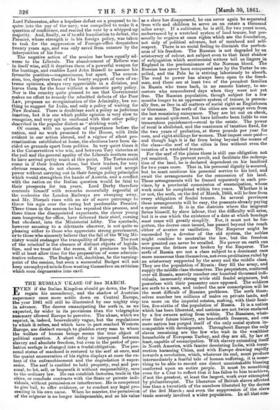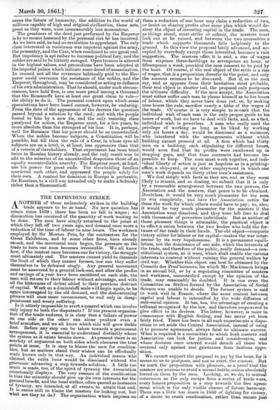THE RUSSIAN UKASE OF 3nn MARCH. E VEN if the Italian
Kingdom should go down, the Pope regain his ascendancy, and the shadow of Austrian supremacy once more settle down on Central Europe, the year 1861 will still be illustrated by one mighty step in advance. The decree emancipating the serfs is, as we expected, far wider in its provisions than the telegraphic summary allowed Europe to perceive. The ukase, which we reprint, is, indeed, benevolently vague, but the regulations to which it refers, and which have in part reached Western Europe, are distinct enough to gladden every man to whom the welfare of human beings seems the true object of political exertion. A short delay is interposed between slavery and absolute freedom, but even in the period of pro- bation serfage is changed into a feudal obligation. The per- sonal status of manhood is restored to the serf at once, and the quaint enumeration of his rights displays at once the ex- tent of the enfranchisement and the degradation it super- sedes. The serf is enabled to hold property, real and per- sonal, to let, sell, or bequeath it without responsibility, save to the ordinary law. He can establish factories, trade in the cities, or conclude contracts with the State or private indi- viduals, without permission or interference. He is competent to give bail, to offer evidence, or to conduct any legal pro- ceeding in his own name. When he marries, the permission Of the seigneur is no longer indispensable, and as his value as a slave has disappeared, he can never again be separated from wife and children to serve on an estate a thousand miles away. If a cultivator, he is still, for two yeari'more, embarrassed by a wretched system of land tenure, but per- tonally he regains at once rights which are the foundation, not only of political advance, but of manhood and self- respect. There is no social feeling to diminish the perfect- ness of his freedom. The Russian is not degraded by an aristocracy of colour, not subject even to that faint shadow of subjugation which sentimental writers tell us lingers in 'England in the predominance of the Norman blood. The Russian has never been conquered save by the Tartar he ex- pelled, and the Pole he is striving laboriously to absorb. The road to power has always been open to the freed- man, and there are at least two of the proudest families in Russia who trace back, in no remote history, to an- cestors who remembered days when they were not yet five. The Russian population, though subject for a few months longer to an oppressive system of tenure, is person- ally free, as free in all matters of social right as Englishmen or Germans. The serfs of the cities are exempt even from the last remaining annoyance. They are let out on obrok, or an annual quit-rent, but have hitherto been liable to one tremendous punishment—recal to the estate. The power of recal is abolished, and the maximum of taxation fixed, for the two years of probation, at three pounds per year for men, and eight shillings for women. That impost once paid and though high it is far from being beyond the means of the class—the serf of the cities is free without even the vexation of a wretched tenure.
For the serf of the plains there is still one obligation not yet remitted. To prevent revolt, and facilitate the redemp- tion of the land, he is declared dependent on his landlord for two years more. That is, his personal dignity is secured, but be must continue his personal service to his lord, and await the arrangements for the concession of his land. These arrangements will be framed separately in each pro- vince, by a provincial commission of emancipation, whose work must be completed within two years. Whether it is or not, the serfs, on the 3rd of March, 1863, will be free from every obligation of feudal tenure. In several provinces these arrangements will be easy, the peasants already paying a specie rental. It is in the districts where the seigneur farms himself, by slave labour, that the difficulty will, arise, but it is one which the existence of a date at which bondage must cease will greatly simplify. For, it must not be for- gotten, the decree once issued, has passed beyond the reach either of avarice or vacillation. The Emperor might be succeeded by a devotee of the old system, the nobles might combine to neutralize the law, but the freedom now granted can never be recalled. No power on earth can reimpose the fetters now broken by the Emperor. The serfs of Russia are not a class subject to a dominant race more numerous than themselves, not even proletaires ruled by an aristocracy supported by the army and the middle class. They are the population of Russia : they fill the army, and supply the middle class themselves. The proprietors, scattered over all Russia, scarcely number one hundred thousand indi- viduals, immensely strong while still feudal seigneurs, but powerless with their peasantry once opposed. The soldiers are serfs to a man, and indeed the new conscription will be the most difficult of Russian problems. The serfs them- selves number ten millions of males on private lands, and ten more on the imperial estates, making, with their fami- lies, five-sixths of the population of Russia. It is a nation which has been liberated, and nations are not twice enslaved by a few owners acting from within. The Russians, what- ever their future history, are henceforth freemen, and one more nation has purged itself of the only social system in- compatible with development. Throughout Europe the only slaves remaining are the few who wait in the wealthier households of European Turkey, and they are all, by law at least, capable of emancipation. With slavery extending itself in North America, with famine desolating India, with insur- rection harassing China, and with Europe drawing rapidly towards a revolution, which, whatever its end, must produce intermediately a fearful tale of human suffering, it is some- thing to be able to record one direct unmistakable blessing conferred upon an entire people. It must be something even for a Czar to reflect that it has fallen to him to achieve, if not the greatest, at least the largest, work ever attempted by philanthropist. The liberation of British slaves affected less than a twentieth of the numbers liberated by the decree of the 3rd March ; and even the suppression of the slave trade scarcely involved a wider population. In all that coil- cerns the future of humanity, the addition to the world of millions capable of high and original civilization, those acts, great as they were, were immeasurably less momentous. The greatness of the deed just performed by the Emperor is by no means lessened by the personal risk he has incurred. As we have said, he had no revolution to apprehend. The only class interested in resistance was impotent against the army, the peasantry, and the Czar, when combined to one great end. But impotency is apt rather to increase political fury, and the nobles are said to be bitterly enraged. Open treason is uttered in the highest salons, and precautions have been adopted at the imperial palace which indicate some dread of assassination. In council not all the reverence habitually paid to the Em- peror could overcome the resistance of the nobles, and the Emperor, throughout, may be considered as acting in defiance of his own administration. That he should, under such circum- stances, have held firm, is one more proof among a thousand that the Romanoffs have at least one great claim to rule— the ability to do it. The personal contest upon which some speculations have been based cannot, however, be enduring. From the date of the appearance of the decrees the question passed beyond a solution by the cord; and with the people bound to him by a new tie, and the only resisting class paralyzed for action, the Emperor must, for a few years, be more absolute than the strongest of his line. It is, perhaps, well for Russians that his power should he so uncontrolled. When the nobles become subjects, a Constitution will be possible, but till then the rule of a Czar, in whose eyes all subjects are on a level, is, at least, less oppressive than that of a coterie of slaveholders. That experiment has been tried twice in Russian history already, and the only result was to add to the miseries of an uncontrolled despotism those of an .equally uncontrollable anarchy. The Emperor must, at least, use his power for great ends. The slaveholding families murdered each other, and oppressed the people solely for their own. A contest for dominion in Europe is preferable, for Russians, to a civil war intended only to make a Schuisky richer than a Sheremetioff.































 Previous page
Previous page